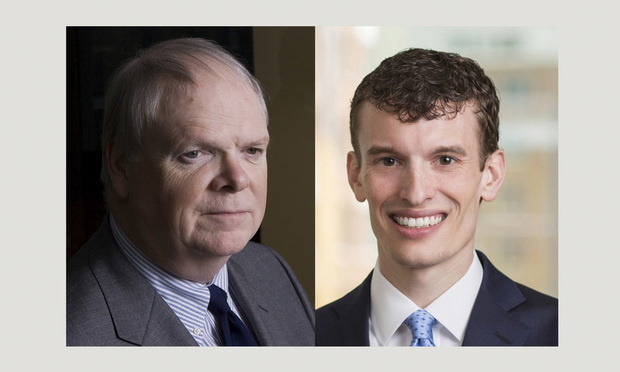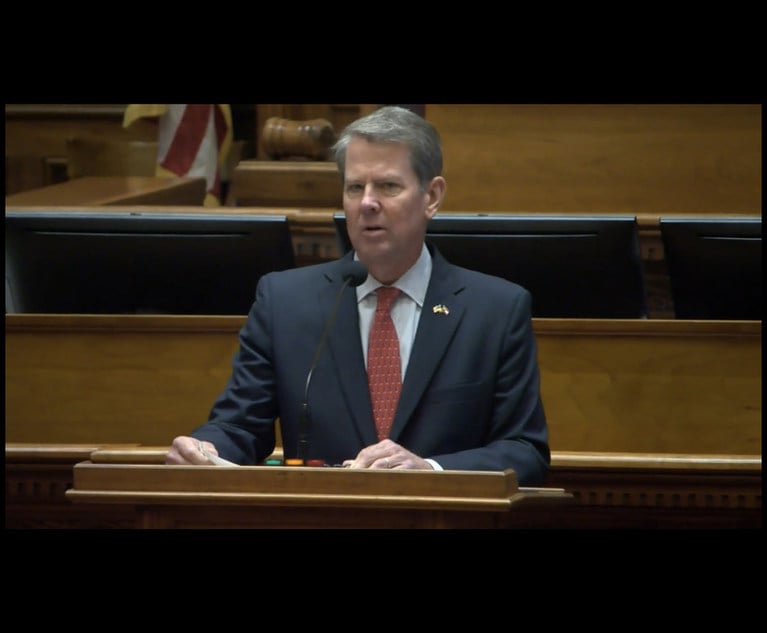Georgia Refuses to Release Outside Counsel Contracts & Billing for SCOTUS Copyright Fight
Georgia has leaned on lawyers from Arnold & Porter; Vinson & Elkins; and Meunier, Carlin & Curfman to defend its claim that the state's annotated legal code is copyrighted.
December 09, 2019 at 06:24 PM
5 minute read
 Anthony Askew (left) and Joshua Johnson. (Courtesy photos)
Anthony Askew (left) and Joshua Johnson. (Courtesy photos)
The state of Georgia won't publicly release its legal bills or contracts with outside counsel hired to defend the state's claims at the U.S. Supreme Court that its annotated legal code is copyrighted.
Attorneys in the state's Office of Legislative Counsel said they won't release the documents for outside counsel at Arnold & Porter Kaye Scholer, Vinson & Elkins and Meunier, Carlin & Curfman because the Georgia General Assembly is exempt from the state public records statute, a claim that is currently being appealed to the state Supreme Court.
Legislative Counsel Rick Ruskell said a Fulton County Superior Court judge and the Georgia Court of Appeals have affirmed the open records exemption, but the Institute for Justice has petitioned the Supreme Court of Georgia to hear its appeal. The high court has yet to decide whether to take the unrelated case.
The Office of Legislative Counsel serves as legal counsel for the General Assembly and state legislators in their official capacities.
"In another time, another place, I would be more than happy to cooperate and negotiate," about whether and what documents to release, Ruskell said.
"It's the wrong time for this office to be releasing records, or information about anything," he said. "It's not because there is some huge secret. … To release information to you would go against our stance in the litigation."
The U.S. Supreme Court is considering Georgia's argument that it holds the copyright for its annotated legal code because the annotations are original "commentary." Legal statutes and judicial rulings in their entirety traditionally are not eligible for copyright protection—a concept known as the "government edicts doctrine."
The state ran up more than $200,000 in legal fees from 2014-2017, after it hired private counsel from Meunier, Carlin & Curfman in Atlanta to stop Public.Resource.Org from distributing the annotated legal code for free, according to federal court records.
Judge Richard Story of the U.S. District Court for the Northern District of Georgia ruled on a motion for summary judgment in 2017 that the state's copyright claim was valid.
In the state's request for fees, lead counsel Anthony Askew said he and the commission negotiated a "heavily discounted hourly rate of $225/hour for every attorney assigned to the case" at the trial level, including senior partners and associates. Askew said that rate, in 2017, was less than half his standard rate of "more than $500 an hour." Firm paralegals billed the state "at a heavily discounted rate of $50/hour."
Askew also contended that the hours expended by Meunier, Carlin & Curfman lawyers were reasonable. A summary of attorney time from 2014 through 2017 included just under 946 hours billed by the three lawyers and 34 hours billed by two paralegals.
Story denied the fee request.
State lawyers won't confirm whether the commission ever paid the legal bills or say what it's spent on fees since then. Askew couldn't be reached for comment.
The U.S. Court of Appeals for the Eleventh Circuit reversed Story's decision on the copyright, teeing up the appeal to the U.S. Supreme Court. Oral arguments were Dec. 2.
Although he wouldn't release the documents, Ruskell said that Washington, D.C., attorney Joshua Johnson—who argued for the state at the U.S. Supreme Court—worked pro bono with support from the University of Virginia Supreme Court Litigation Clinic.
Johnson, who is counsel at Vinson & Elkins in Washington, D.C., said the law firm also provided its services pro bono. Vinson & Elkins partner Jeremy Marwell and senior associate Matthew Etchemendy are listed as Johnson's co-counsel.
Johnson also confirmed that law students from the University of Virginia Law School's Supreme Court Litigation Clinic assisted with the case. Daniel Ortiz—a UVA law professor and the law school Supreme Court clinic's legal director—is also listed on court documents as a lawyer for the commission.
Four other lawyers also appear on behalf of the commission. They are Arnold & Porter partner John Elwood; and Meunier, Carlin & Curfman lawyers Askew, Lisa Parento, and Warren Thomas.
Public.Resource.Org founder Carl Malamud said his lawyers have all volunteered pro bono. Elizabeth Rader, Sarah LaFantano and Jason Rosenberg—all at Alston & Bird when Public.Resource.Org was first sued—defended the organization before the district court and at the Eleventh Circuit. Rader, now at Calliope Legal in Washington, D.C., remained on the case after the Supreme Court granted Georgia's cert petition. She was joined by Thomas Goldstein and Eric Citron of Goldstein & Russell. Citron argued the case before the high court.
Malamud credited his lawyers — including David Halperin, a former fellow at Harvard University's Berkman Klein Center but now a sole practitioner in Washington, D.C. — for their work on the case. "They believe in the cause," he said. "I couldn't possibly afford lawyers of this caliber. We wouldn't be in front of the court if they hadn't pitched in."
Correction: A previous version of this story stated that David Halperin was at Harvard University's Berkman Klein Center. He is a sole practitioner in Washington, D.C.
This content has been archived. It is available through our partners, LexisNexis® and Bloomberg Law.
To view this content, please continue to their sites.
Not a Lexis Subscriber?
Subscribe Now
Not a Bloomberg Law Subscriber?
Subscribe Now
NOT FOR REPRINT
© 2025 ALM Global, LLC, All Rights Reserved. Request academic re-use from www.copyright.com. All other uses, submit a request to [email protected]. For more information visit Asset & Logo Licensing.
You Might Like
View All
Georgia Republicans Push to Limit Lawsuits. But Would That Keep Insurance Rates From Rising?
5 minute read
A Plan Is Brewing to Limit Big-Dollar Suits in Georgia—and Lawyers Have Mixed Feelings
10 minute read
Panel to Decide if Governor Should Suspend Georgia Lawyer From Elected Post
4 minute readLaw Firms Mentioned
Trending Stories
- 1Million-Dollar Verdict: Broward Jury Sides With Small Business
- 2'Reluctant to Trust'?: NY Courts Continue to Grapple With Complexities of Jury Diversity
- 3'Careless Execution' of Presidential Pardons Freed Convicted Sex Trafficker, US Judge Laments
- 4Newsmakers: Littler Elevates Dallas Attorney to Shareholder
- 5South Florida Real Estate Lawyers See More Deals Flow, But Concerns Linger
Who Got The Work
J. Brugh Lower of Gibbons has entered an appearance for industrial equipment supplier Devco Corporation in a pending trademark infringement lawsuit. The suit, accusing the defendant of selling knock-off Graco products, was filed Dec. 18 in New Jersey District Court by Rivkin Radler on behalf of Graco Inc. and Graco Minnesota. The case, assigned to U.S. District Judge Zahid N. Quraishi, is 3:24-cv-11294, Graco Inc. et al v. Devco Corporation.
Who Got The Work
Rebecca Maller-Stein and Kent A. Yalowitz of Arnold & Porter Kaye Scholer have entered their appearances for Hanaco Venture Capital and its executives, Lior Prosor and David Frankel, in a pending securities lawsuit. The action, filed on Dec. 24 in New York Southern District Court by Zell, Aron & Co. on behalf of Goldeneye Advisors, accuses the defendants of negligently and fraudulently managing the plaintiff's $1 million investment. The case, assigned to U.S. District Judge Vernon S. Broderick, is 1:24-cv-09918, Goldeneye Advisors, LLC v. Hanaco Venture Capital, Ltd. et al.
Who Got The Work
Attorneys from A&O Shearman has stepped in as defense counsel for Toronto-Dominion Bank and other defendants in a pending securities class action. The suit, filed Dec. 11 in New York Southern District Court by Bleichmar Fonti & Auld, accuses the defendants of concealing the bank's 'pervasive' deficiencies in regards to its compliance with the Bank Secrecy Act and the quality of its anti-money laundering controls. The case, assigned to U.S. District Judge Arun Subramanian, is 1:24-cv-09445, Gonzalez v. The Toronto-Dominion Bank et al.
Who Got The Work
Crown Castle International, a Pennsylvania company providing shared communications infrastructure, has turned to Luke D. Wolf of Gordon Rees Scully Mansukhani to fend off a pending breach-of-contract lawsuit. The court action, filed Nov. 25 in Michigan Eastern District Court by Hooper Hathaway PC on behalf of The Town Residences LLC, accuses Crown Castle of failing to transfer approximately $30,000 in utility payments from T-Mobile in breach of a roof-top lease and assignment agreement. The case, assigned to U.S. District Judge Susan K. Declercq, is 2:24-cv-13131, The Town Residences LLC v. T-Mobile US, Inc. et al.
Who Got The Work
Wilfred P. Coronato and Daniel M. Schwartz of McCarter & English have stepped in as defense counsel to Electrolux Home Products Inc. in a pending product liability lawsuit. The court action, filed Nov. 26 in New York Eastern District Court by Poulos Lopiccolo PC and Nagel Rice LLP on behalf of David Stern, alleges that the defendant's refrigerators’ drawers and shelving repeatedly break and fall apart within months after purchase. The case, assigned to U.S. District Judge Joan M. Azrack, is 2:24-cv-08204, Stern v. Electrolux Home Products, Inc.
Featured Firms
Law Offices of Gary Martin Hays & Associates, P.C.
(470) 294-1674
Law Offices of Mark E. Salomone
(857) 444-6468
Smith & Hassler
(713) 739-1250







